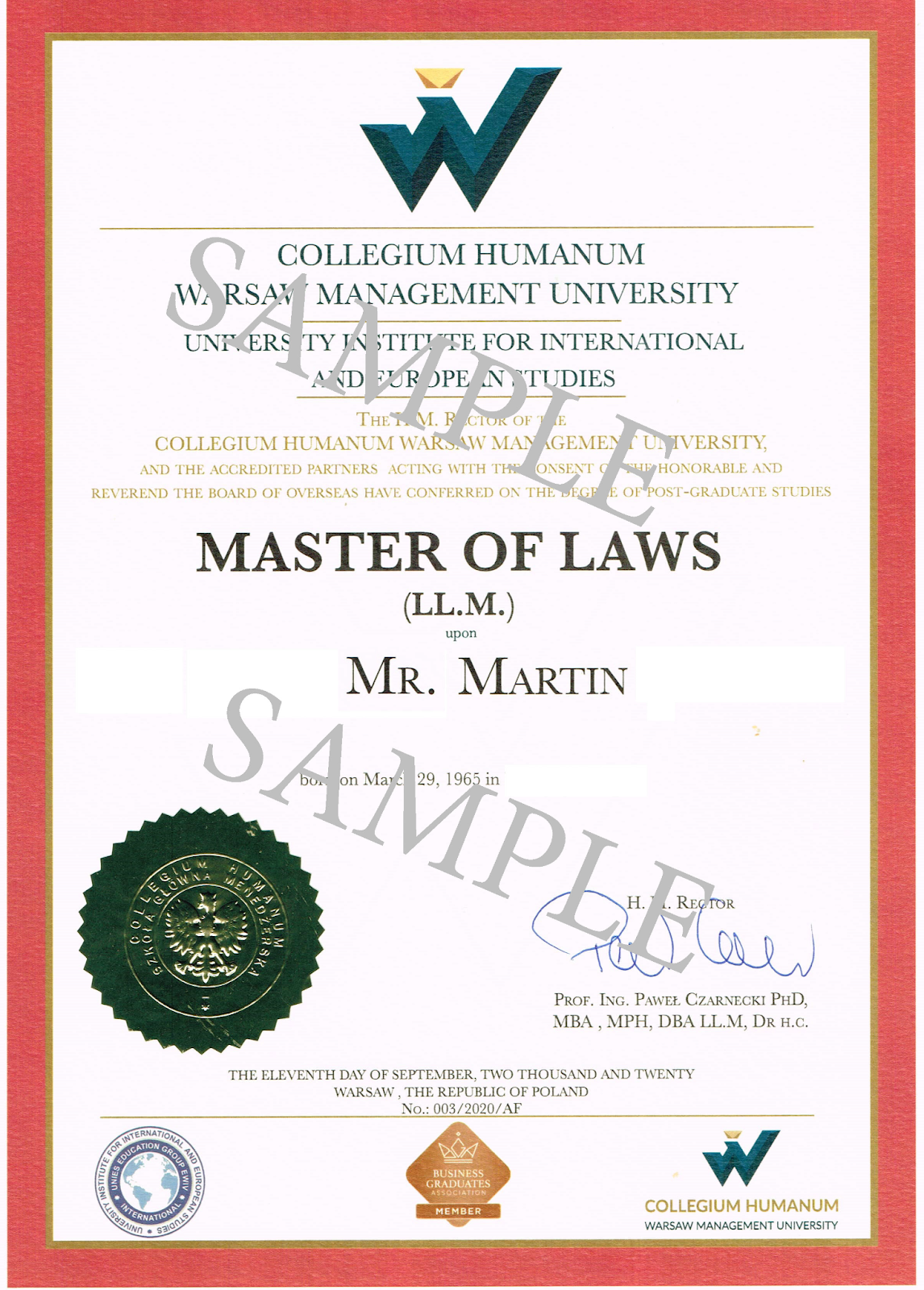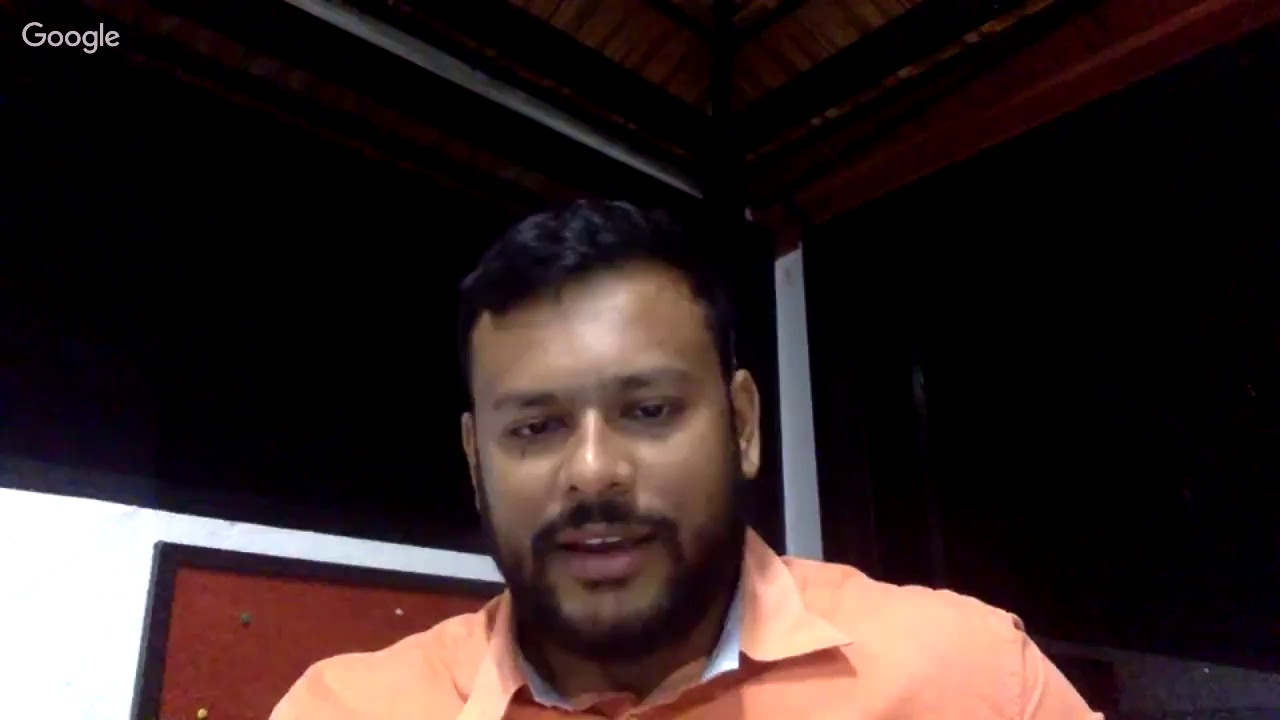In Association with

Warsaw Management University
Introduction
Have you ever been to a European country on a tour?
And at that time, have you wondered what it would be like to live and work in that country?
European countries are known for their work-life balance, unlike the US. Europe also affords a really huge market, considering that the European Union (EU) is an economic and political combination of 27 countries.
But it’s not like you can board a plane and land straightaway in Europe to live and work there, right?
In order to secure any kind of work in a European country, you would need to have some qualifications and work experience that they recognise. Unfortunately, the standard specialisations in law that you would find in India aren’t something that are a skill shortage in these countries.
If you want to survive there, you would need to know the laws of these countries themselves. For this, you would probably need to study a Masters programme in these countries, right?
This is not something that everyone can manage. For one, even the second tier universities in relatively cheaper countries in Europe can be expensive for an Indian student. Consider University of Barcelona, Spain, for example, which is ranked 30 in the list of top universities in Europe (see here) can cost up to EUR3300 (approximately INR 290000) for a masters degree spanning one year.
Secondly, the costs of living in these countries can be killing, at approximately EUR 750 - 1100 per month, depending upon the country and the place where you are living.
And yet, even that is not enough, because the local lawyers would anyway be better at the local laws than you. And they would have worked for a European employer or a client.
So how do you crack this?
Actually, the pandemic already did something to change the situation.
It is the “death of geography”, as a leading newspaper in India calls it.
During the period when the pandemic cast complete terror, many organisations moved their processes online because they had to. These organisations do not have intentions to move functions which can be managed online back to the brick and mortar form anytime soon. They found that it is possible to manage these efficiently and cost effectively online and more importantly, they are not eager to leave their functioning vulnerable to take a hit again.
The internet does not have geographical borders. Cloud based systems can be equally available to someone in Europe as they would be to someone in the US, India, Singapore or Australia. Consequently, work which can be delivered by someone in Europe can be delivered by someone in India, provided they know how to do it.
At least, the industry seems to think this.
This is why you can see that the list of remote jobs and freelancing paralegal opportunities has consistently kept on increasing on job portals and freelancing sites such as UpWork, Fiverr and Freelancer.
European countries, which are fabled to be traditional, have also begun to adapt to remote or “homeworking” or “home based” legal jobs.
For example see here:
A search for ‘Home Based Legal’ jobs in the United Kingdom, gives over 1400 jobs as a result, just on one website - Indeed.
You already have the advantage of talent arbitrage, because a lawyer in India would cost far less than minimum wage regulated European countries.
Specialisation: International trade and taxation
Right from the birth of a business, you would find its management conscious of one thing. If you mention this, you have a businessman’s immediate attention.
This one thing is taxation. Taxation is what allows you to get to the chest of founders and management, irrespective of whether it is a small startup or a large multinational corporation.
While startups may struggle with the applicability and timely compliance, multinationals will struggle with structuring their taxes to minimise the dent that such taxes cause in the distributable profits of the company.
According to this IMF article, tax havens collectively cost governments amounts between USD500 billion and USD600 billion in lost corporate tax revenue. American Fortune 500 companies alone held an estimated USD2.6 trillion offshore.
Governments compete to reduce tax rates and invite more investment and increase employment in the country, and this allows multinationals to “structure” their taxes with having a base in one country, having assets in another and having markets and customers in yet another country.
Obviously this kind of planning is not easy.
It needs a detailed study of international taxation mechanisms, particularly the ‘charging events’ and also needs a knowledge of the tax laws of multiple countries.
A need to possess knowledge about international taxation is of even greater significance where international trade is on an increase. The provision of services over the internet has skyrocketed. Consider how many of you began to use Zoom, MS Teams, Google Meet or Webex in 2020-2021 (all examples of SaaS).
In this research by a Forbes Councils Member, the SaaS revenue is projected to be USD369.4 billion in 2024.
And it’s not just SaaS. As the world becomes more borderless by the day, international trade is only ever going to increase in other spheres. Along with using Zoom, you would easily find people who have ordered something or other through AliExpress. It most likely does not come from a supplier in your country.
There are many people who successfully initiated dropshipping businesses in 2019, and while the euphoria around it might have receded, it’s still projected to increase in size, given that people have and want more and more choice in products now.
These kinds of businesses which are international right from the start will need more and more professionals who understand international trade and taxation.
Why does a degree from a Polish university make sense?
Poland has emerged as the new outsourcing destination with banks, law firms, professional services companies, multinational financial institutions and global conglomerates looking to move more complex tasks out of their head offices to Central Eastern Europe. With Poland's (cities like Warsaw, Wroclaw, Krakow, Gdansk) proximity to western capitals, EU membership, large talent pool and lower costs, it has now become the financial hub. With Brexit, companies are looking at other cost friendly options which would grant access to the EU's single market.
Law Firms are also shifting base to Poland so as to have access to the EU's legal and regulatory framework. Poland is now beginning to pose a challenge to India as the financial services industry’s preferred location for back-office functions.
Poland's experienced professionals, deep and rich job market, predictable employment and labour laws, low labour cost, flexibility in work organisations and strategic location have made it a true leader in the European SSC/BPO sector. For western companies, the attraction of outsourcing to Poland is the chance to cut costs without cutting expertise.
Deutsche Bank, State Street, Toshiba, Sony Pictures, Bayer, ThyssenKrupp, Arla, Wipro, Staples, PwC, Lufthansa, Thomson Reuters, Cognizant, Jones Lang LaSalle, HSBC, Credit Suisse, Goldman Sachs, UBS, RBS, JP Morgan Chase & Co, BNY Mellon, ABSL, Royal Dutch Shell, Amazon, Procter & Gamble, Citi group, Accenture, Hewlett-Packard, Infosys, IBM, Motorola, CapGemini, Dentons Law Firms, Linklaters (law firm), Baker McKenzie (law firm), DLA Piper (law firm), White & Case LLP (law firm) are few companies/firms who have offices in Poland and have generated close to 300,000 employment opportunities.
With Poland becoming the new hub for shared service centers, there will be huge demand for people who have studied from a university there, especially people with knowledge of international business laws, commercial transactions, international trade and taxation. Europe is a promising destination for law graduates to pursue international law, especially international trade law, mostly because of the significance of the region and its contribution to international trade. An LL.M from Warsaw would open a host of opportunities for graduates looking at the above scenario.
If I were to just stay in India, how important is the knowledge of international business laws and commercial transactions or international trade and taxation for the management of an Indian organisation?
Considering the accessibility of markets, many businesses will look outside of their countries for markets, for capital, for affordable talent etc.
This has already started to happen.
You can find businesses being initiated in a country with the sole objective of serving customers in another country, without having any regards to the local scenario.
Have a look at the top 10 Indian startups listed here. Out of 10, barring Udaan, Agnikul Cosmos and Playment, 7 have already expanded outside India or founders have been publicly quoted stating they have expansion plans. Playment was recently acquired by TELUS, a Canada based company in July 2021. Almost all of them have or had foreign investors.
Consider the Indian unicorns which have lined up for an IPO in 2021 and you will find that a majority of them already have global operations and almost all have foreign investors.
This kind of surge in cross border operations will necessitate lawyers who are aware not only of the local laws applicable to a business, but also the laws of other countries to which these businesses plan to expand.
The signs are very clear. If you want to score with these companies, you will need to be equipped with knowledge of international trade, business laws and international taxation. Local knowledge will give you a limited scope.
The more multi-jurisdictional legal knowledge a lawyer has, the more they will be in demand.
Is a Masters degree useful to me if I am a local practitioner?
Not an ordinary masters degree maybe, but one from an international university and one reflecting knowledge in international business laws is.
It brings instant reliability to your profile if you quote a degree from an international university, especially if you are serving clients which either have multinational operations or are looking to expand internationally.
About Warsaw Management University

The Warsaw Management University is one of the oldest universities in Poland. About 80,000 Polish and international students have graduated from it since its foundation 20 years ago.
Collegium Humanum – Warsaw Management University is an international private university with its seat in ul. Moniuszki 1A, 00-014 Warszawa, has been authorized by the Minister of Science and Higher Education, as a higher education institution with the name Warsaw Management University.
The UNIES Business School has been founded by cooperation agreement of CH Warsaw Management University (Poland) with UNIES EWIV (Germany). UNIES Business School of CH-Warsaw Management University has become a Business School of WMU for the delivery of WMU´s undergraduate and postgraduate programmes of studies in the international market at offshore-campus and training centres in Asia, Africa and Europe.
Collegium Humanum is a member of the Business Graduates Association, which is an international membership and quality assurance body of world-leading and high-potential Business Schools who share a commitment for responsible management practices and lifelong learning, and are looking to provide positive impact on their students, communities, and the economy as a whole.
Since 2020, Collegium Humanum has been a signatory to PRME (the Principles for Responsible Management Education),an international forum of leading business universities from around the world operating under the auspices of the United Nations, whose aims are to shape global attitudes of social responsibility among future leaders across business, politics and other dimensions of public life.
The School is offering a one month immersion program too, at an additional cost.
How is this course different from other LLM programs?
Immersion
An immersion program at the campus of Warsaw Management University/neutral venue can be offered to the candidates looking at the demand for the same from the students. The fee for the same will be in addition to the tuition fee.
Who should take this course?
This LL.M. program is ideal for individuals who aspire to become legal experts in international trade and taxation, equipping them with advanced knowledge and skills in these specialized areas.
- Experienced lawyers and legal practitioners seeking to deepen their expertise in international trade and taxation law will find this course highly valuable for advancing their careers.
- Professionals in the global business arena who want to gain a comprehensive understanding of the legal aspects of international trade and taxation will benefit significantly from this program.
- Individuals working in government agencies responsible for shaping and enforcing international trade and taxation policies will find this course essential to enhance their effectiveness in their roles.
- In-house legal counsel representing multinational corporations will benefit from this course, as it will empower them to provide expert guidance on complex international legal matters.
- Tax consultants and specialists looking to broaden their knowledge and specialize in international taxation will find this LL.M. program invaluable.
- Professionals responsible for ensuring their organizations comply with international trade and taxation regulations will gain the expertise needed to navigate this complex landscape.
- Those interested in pursuing an academic career or conducting research in the fields of international trade and taxation law will find this program an excellent foundation.
- Individuals from diverse backgrounds who wish to transition into a legal career focused on international trade and taxation can use this program as a stepping stone.
- Anyone with a strong interest in international affairs, global economics, and the legal dimensions of international trade and taxation will find this course intellectually stimulating and relevant.
Overall, the Master of Laws (LL.M.) in International Trade and Taxation in association with Warsaw Management University caters to a wide range of professionals and enthusiasts looking to excel in the dynamic and interconnected world of international trade and taxation law.
It equips them with the knowledge and skills required to address complex legal challenges in today's global business environment.
What will you learn from this course?
In the LL.M. in International Trade and Taxation program offered in association with Warsaw Management University, you will gain a comprehensive understanding of various aspects related to international trade and taxation.
This course is designed to equip you with the knowledge and skills necessary to excel in the dynamic and complex field of global trade and taxation.
Throughout this program, you will:
- Gain in-depth knowledge of international trade agreements, regulations, and policies that govern the global movement of goods and services. Understand the principles of the World Trade Organization (WTO) and how they impact international trade.
- Delve into the intricacies of taxation laws, both domestic and international, and how they affect businesses operating on a global scale. Learn about transfer pricing, double taxation treaties, and tax planning strategies.
- Acquire the skills needed to navigate cross-border business transactions, including import/export regulations, customs procedures, and international contracts.
- Learn how to analyze and resolve trade disputes through negotiation, arbitration, and other dispute resolution mechanisms.
- Understand the economic and financial implications of international trade and taxation. Explore topics such as currency exchange, trade financing, and international investment.
- Stay updated with the latest developments in international trade and taxation law, including emerging trends, case studies, and regulatory changes.
- Hone your research and writing abilities, critical for legal professionals in this field. Learn to draft legal documents, memos, and reports effectively.
- Apply your knowledge to real-world scenarios through case studies, simulations, and practical exercises, gaining valuable hands-on experience.
- Develop a global perspective on trade and taxation issues by interacting with international peers, participating in discussions, and examining diverse cultural and legal contexts.
- Whether you aspire to work in private practice, governmental agencies, multinational corporations, or international organizations, this program will prepare you for various roles within the field of international trade and taxation.
By the end of the LL.M. program, you will be equipped with the expertise and confidence to navigate the complex legal landscape of international trade and taxation, making you a valuable asset in the global legal community.
Training Methodology

Online 24/7 access
Access study materials via our online portal & via our anroid & iOS apps.

Practical Exercises
Two practical exercises every week, each followed by written feedback.

Live Online Classes
Live online classes based on exercises, allowing questions and feedback.

Convenient Class timings
Classes held after work hours, typically on Sundays or after 8 PM on weekdays.

Live Doubt Clearing
Live doubt clearing for support and one-on-one sessions with mentors.
What is the career potential after doing this course?
The Master of Laws (LL.M.) in International Trade and Taxation in association with Warsaw Management University offers an exciting and lucrative career path in the fields of international trade and taxation.
This specialized program equips students with a comprehensive understanding of the legal, economic, and regulatory aspects of global trade and taxation, opening up a wide range of career opportunities in both the public and private sectors.
Here's a look at the career potential after completing this course:
- Graduates can work as consultants helping businesses navigate complex international trade regulations, tariffs, and customs procedures. They advise on trade compliance, market entry strategies, and international business expansion.
- LL.M. graduates specializing in taxation can pursue careers as tax advisors or consultants, assisting individuals and corporations in optimizing their tax strategies, compliance, and international tax planning.
- With a deep understanding of trade regulations, customs procedures, and compliance requirements, students can work in customs brokerage firms or for multinational corporations ensuring that goods move smoothly across borders while adhering to all legal requirements.
- Many corporations seek in-house legal counsel with expertise in international trade and taxation to navigate complex legal issues, contracts, and regulatory compliance on a global scale.
- Graduates can explore career opportunities in government agencies responsible for trade and taxation policy formulation and enforcement. Positions in customs agencies, tax authorities, and trade ministries are potential options.
- Organizations like the United Nations, World Trade Organization (WTO), International Monetary Fund (IMF), and World Bank often hire professionals with expertise in international trade and taxation to work on global economic and legal issues.
- Some LL.M. graduates choose to pursue careers in academia, becoming professors or researchers in law schools or think tanks, contributing to the development of trade and tax law.
- Many international law firms have specialized practices in international trade and taxation. Graduates can join such firms as associates, advising clients on cross-border legal matters.
- Graduates can work in agencies dedicated to promoting international trade and investment, helping businesses identify opportunities in foreign markets and navigate legal complexities.
- Armed with a strong understanding of international trade and taxation, some graduates may choose to start their own consulting firms, providing specialized services to businesses in need of expert advice in these areas.
The LL.M. in International Trade and Taxation not only provides a strong foundation in legal principles but also enhances critical thinking, research, and problem-solving skills.
This versatile skill set opens doors to a variety of career paths in the dynamic and globalized world of international trade and taxation, offering a promising and rewarding future for those who choose to pursue this program.
How can you help businesses and clients after you obtain an international LLM degree?
Here are 7 ways in which you can help businesses and international clients with the following after you complete this course:
Advise on market entry/expansion strategy
This is the first question faced by an entity planning to go international - where to begin from, what destination to select based on specific objectives. As someone who is trained in different aspects of international business laws, you will be able to inform an employer or a client about which country will offer the most suitable legal environment keeping their objectives in mind. You will also be able to inform them about multiple entry options and the legal formalities required for their selected option.
Incorporate entities in multiple countries and determine corporate governance structures
When you have an idea of the different business structures available in a country, the procedure to incorporate entities in that country and also determine the corporate governance structures that can be applied not only for the holding company, but also the subsidiaries in different countries, this would be invaluable information for an employer or a client.
It will also give you an edge over consultants who can take the benefit if you are unaware how easy or difficult the procedures in that country are.
Negotiate, draft and review contracts for multiple transactions
Transactions are at the heart of any business. When you understand a business’s source of income and its transactions, you would be able to negotiate and review contracts for that business much better. With a Masters degree which gives you an all round view of multiple business aspects, you will understand the transactions much better.
For instance, you will have the knowledge of what representations and warranties should be asked for, in an investment contract with a company having significant intellectual property, because you will understand how the monetisation and protection of intellectual property works.
Help companies with their data protection compliance
This is going to be a highly demanded skill, considering the explosion of cloud based and SaaS companies during and post the pandemic. More and more countries are strengthening their data protection laws and if you can develop a company’s systems and processes to ensure compliance with these, it can make you a very desirable candidate for multinational companies.
Help companies with cross border mergers and acquisitions
Here’s a Bloomberg report which talks about cross border M&A breaking records for the first quarter of 2021. As geographical barriers thin down, these transactions are only going to increase. Anyone who is skilled in how M&A transactions work, especially cross border mergers will thrive.
Help companies with securing finance for international trade and completing customs and border protection related procedures and documentation
As e-commerce businesses thrive and international trade expands, there will be a consistent requirement for trade financing and consequently, professionals who understand how imports and exports work and are regulated in different countries will also be required.
Given that we have twice been hit by pandemic waves, customs and border protection regulations will likely be tighter around imports from other countries. For example, as of July 2021 there are quite a few countries which wouldn't accept post from India. However, they will accept couriers from DHL. Why? Because multinationals like DHL are well aware of the safety requirements for packages being shipped to these countries. Knowledge of customs clearance requirements helps. Do you think companies like DHL would benefit from having professionals who are aware of such requirements and formalities? Definitely.
International tax structuring for multinational companies
The Double Irish Dutch Sandwich or the Single Malt tax structures (now redundant) weren’t the only tax structures to be used. There are probably many more like these, waiting to be discovered by the Governments of the relevant countries. Whoever thought of these structures must have had the thorough knowledge of the tax laws and charging events of multiple countries. Do you think multinational companies would want such people who can help them structure their transactions to save millions of dollars in tax in many countries perfectly legally? It’s a no brainer.
Potential Employers and Clients
- Multinational companies
- International law firms
- Startups with global expansion plans
- Practically, everyone entering into a cross border contract or transaction
Business teams that you can work in
Upon completing the LL.M. in International Trade and Taxation program in collaboration with Warsaw Management University, graduates can explore a variety of professional avenues. These career paths include:
- Graduates can pursue a career in legal practice, specializing in international trade and taxation law.
- Professionals can choose to work in compliance and regulatory departments within multinational corporations or government agencies.
- Graduates may opt for roles focused on policy analysis and development, where they can influence international trade and taxation policies at the national or international level.
- Graduates with expertise in international trade and taxation can assist companies in developing and executing strategies for expanding their global operations.
- LL.M. graduates can aspire to leadership positions within multinational corporations, serving as Chief Legal Officers (CLOs) or joining the management team.
- Additionally, graduates can leverage their expertise to explore entrepreneurial opportunities, either by establishing their own startup focused on international trade or taxation services, joining early-stage startups as key legal advisors, or offering consultancy services to businesses seeking guidance in these areas.
The LL.M. in International Trade and Taxation program equips students with the knowledge and skills needed to excel in these diverse career paths, making them valuable assets in the dynamic field of international business and law.
What kind of recruitment and placement support will I get?
- Unique Training Method: We're the sole organization in India offering comprehensive, exercise-based courses.
- Employer Recognition: Many leading employers, law firms, and companies actively seek our high-performing students.
- Career Opportunities: Success in our courses can lead to job placements, internships, and assessment internships in esteemed law firms, with renowned lawyers, and various companies.
- Empowering Learners: We focus on empowering learners with not just knowledge and skills, but also real-world opportunities.
- Dedicated Support Team: Our dedicated team is here to assist you with placements, internships, and freelance opportunities.
- Proven Success: Between April 2021 and June 2023, we've helped over 21,000 students secure job and internship opportunities.
- Media Recognition: Our achievements have been featured in respected media outlets like The Hindu, Business World, and India Education Diary.
- Impressive Value: Our students have secured over Rs. 2.7 Crore (USD 330,000) worth of work, with records of INR 30 LPA (USD 37,500) domestically and INR 50 LPA (USD 62,500) internationally.
- Comprehensive Support: From day one, our placement team guides you in setting goals, crafting standout CVs, enhancing interview skills, and supporting your critical first month on the job or during an internship.
- Trusted Recruiters: We've built strong collaborations with recruiters who prefer hiring our well-trained students.
- Competitive Edge: Partnering with us gives you an edge in the job market and opens doors to exciting career prospects.
Can I get remote freelance work after doing this course?
At LawSikho, we have two types of students: those who already possess good legal skills and those who are in the process of learning. We believe in enabling our learners to start earning from their knowledge without delay.
For students with professional-level legal skills, we offer opportunities in contract drafting, data & privacy, international business law, US immigration law, litigation support, and international IP law work, etc.
However, we understand that acquiring professional-level skills takes time. For those who are still developing their legal skills, we provide alternative work opportunities such as writing articles, conducting research, legal transcription, data entry, law firm administration, social media management, and more. Some students even engage in tasks like voice-over work, data compilation, translation, and virtual assistance.
We have established a dedicated team that actively pitches to organizations in the US to help LawSikho students find remote work.
We have set up a US entity to bridge the trust gap between US legal professionals and an organization operating from India.
We focus on getting learners their first three clients, guiding them in crafting impressive proposals. By the time they secure these initial clients, learners become well-adjusted to the process and can independently attract more clients.
They build their CVs and profiles with real work experience and testimonials, opening doors to numerous opportunities.
Getting started is often the hardest part, but at LawSikho, we make the process frictionless. We have witnessed law students earning well over $1000 per month.
Some students have earned $500 in their first month as a side gig. We have students who, after a year, now earn $10,000 per month. While some may start with $300, they make progress by learning new skills, improving their profiles, and pitching for higher-paying work.
Between April 2021 and June 2023, we created over 21000+ opportunities for our learners, resulting in thousands of students securing freelance work. The total value of work secured amounts to over $3,30,000 (Aprox INR 2.7 Crore). Additionally, hundreds of individuals found employment, and secured internships.
Please note that these numbers represent the initial gigs facilitated directly by us or those on which we actively collaborated with the learners. Students have also secured additional work beyond our tracking.
How will you clear my doubts and help me if I am struggling to understand or learn a concept?
- In our live classes, you can ask questions, share your screen, receive personal feedback, and have your doubts cleared.
- If you need more help after getting feedback on an assignment or want career advice, you can schedule a private one-on-one call. Our evaluators and mentors are here to assist you and give you advice that's tailored to your needs.
Sample Degree Certificate
(Note: The certificate issued will contain details of your chosen specialization)

Weekly Assessments
- Weekly practice exercises to learn international work in simulation mode in a safe environment, with in-line feedback from evaluators spread over 13-15 weeks each semester.
- Personalised feedback and mentoring sessions to handhold through the assessments.
- Three years to finish the assessments and be eligible for the degree.
- Access to course materials for five years.
- Weekly exercises to be a combination of drafting, writing, multiple-choice questions and vivas spread over four semesters in 78 credits.
Core Subjects
Subject 1: Introduction to Legal Systems Across the World and Hierarchy of Courts (4 Credits)
Legal systems around the world - common law and civil law
How are international disputes resolved: Framework and mechanisms
Overview of courts system for commercial disputes in different countries
- US
- UK
- Europe, with focus on Germany, France and Netherlands
- Canada
- Brazil
- India
- UAE
- Singapore
- Japan
- Hierarchy of courts for commercial disputes
- Specialized commercial courts/ commercial divisions
- Availability of small claims courts and fast-track procedures
- Caps
- Procedural Simplifications
- Can Parties Represent Themselves
- Availability and criteria for pretrial attachment of movable assets
- Automatic & Random Assignment of Cases to Judges
- Evidentiary weight of a woman’s testimony
Case management
- Timelines for following processes under civil procedure laws
- service of process;
- first hearing;
- filing of the statement of defense;
- completion of the evidence period;
- filing of testimony by expert; and
- submission of the final judgment
Restrictions on number and circumstances of adjournments
Public availability of performance measurement reports to monitor progress of cases and compliance with timelines
Use of pretrial conferences for case management
- scheduling (including the time frame for filing motions and other documents with the court);
- case complexity and projected length of trial;
- possibility of settlement or alternative dispute resolution; exchange of witness lists;
- Evidence;
- jurisdiction and other procedural issues; and
- narrowing down contentious issues
Availability of electronic case management systems for various processes
- access laws, regulations and case law;
- access forms to be submitted to the court;
- receive notifications (for example, e-mails);
- track the status of a case;
- view and manage case documents (briefs, motions);
- file briefs and documents with the court; and
- view court orders and decisions in a particular case
Automation of court proceedings
- Possibility of electronic filing procedures without in-person interaction
- Electronic service of complaint on the defendant
- Electronic payment options for court fees
- Public availability of judgments rendered by local courts
Which alternative dispute resolution methods are used to resolve international disputes?
Which resources can you use to find out about legal systems in a country?
Subject 2: Advanced Contract Drafting (8 Credits)
Contract Anatomy - Introduction to parts of a contract
- The different parts of a contract, and the sequence in which different clauses customarily appear in a contract
- The categories to which each clause in a contract pertains
- The Definitive Contract Drafting Checklist
Title, recitals, definition and interpretation clauses
- The relevance of the introductory parts of a contract
- How are introductory clauses drafted
Representations and Warranties clauses and covenants
- What are representations and warranties and why are they required?
- Tips and strategies in drafting representations and warranties clauses
- The consequences of false representations
- What are covenants?
Conditions Precedent, Conditions Subsequent and Completion
- The concept of conditions precedent and the relevance of the conditions precedent clause in a contract
- Conditions subsequent and completion
- The consequences of breach of conditions precedent and conditions subsequent clauses
- How to draft the conditions precedent, conditions subsequent and completion clauses
How to Draft Obligations and Payment Clauses in Any Contract
- The relevance of the obligations and payment clauses
- How payment and increment clauses are drafted
- The consequences of default in payment
- How should consideration clauses be drafted?
Term, termination, renewal and survival clauses
- How to decide the ‘term’ of a contract and draft the ‘term’ clause
- How termination is connected with the term of the contract and how to draft termination clauses
- The different methods by which a contract can be renewed
- Which obligations under the contract continue to be applicable even after termination?
Assignment and Change of Control Clauses
- Which rights in an agreement can be assigned and which ones can be retained
- How anti-assignment clauses work
- The significance of the ‘change of control’ clauses and how these work
- Is revocation of assignment possible?
Confidentiality, non-compete, non-solicit and exclusivity clauses
- The concept and the need for confidentiality, non-compete, non-solicit and exclusivity clauses
- How to draft an effective confidentiality clause
- In which situations can a non-compete clause be enforced?
- Cases where non-solicit and exclusivity arrangements are used
- What are non-circumvention clauses?
Waiver, Variation and Severability clauses
- What are ‘no-waiver’ clauses?
- Why are variation clauses required?
- What are severability clauses used for?
Indemnity and Limitation of Liability clauses
- The concept of an indemnity clause and the reason why it is required in a contract
- Situations when an indemnity clause can be triggered
- How to draft an effective indemnity clause
- Difference between an indemnity and a guarantee
- The effect of Limitation of Liability clauses
Notice and communication clauses
- Drafting a notice as per the notice clause
- Why it is important to provide for a receipt mechanism in a notice clause
Breach and enforcement related clauses
- The concept of breach and what kinds of scenarios amount to a breach
- Consequences of breach which can be specified in a contract
- Legally permissible remedies in the event of a breach
- Whether to draft a breach clause as a general or specific clause
- Types of liquidated damages clauses which are permitted under Indian law
- What care should you take while drafting a breach clause
- What is the difference between a breach and an indemnity claim?
- How to quantify damages for infringement or other breaches
Governing Law in international contracts: How to choose the applicable governing law?
- The relevance of the Governing Law and jurisdiction clause
- Learn how the Governing Law and jurisdiction clauses should be drafted
What do you need to take care of in order to ensure enforceability of contracts in accordance with the relevant law?
- Does it require execution in a particular manner?
- Does it require approval from a specific authority in accordance with the law?
- Legalisation requirements - stamping, notarisation, apostille
- Reasonability in clauses
- Appropriate choice of governing law
Ten contracts which are universally used in business transactions and how to draft them
- Confidentiality Agreements / Non-disclosure Agreements
- Employment Agreements
- Lease Agreements
- Licensing Agreements
- Power of Attorney Document
- Sale / purchase Agreements
- Distribution Agreements
- Loan Agreements
- Joint Venture Agreements
- Website Development Agreements
Different types of notices / letters which can be used in international contracts
- Notice of claim in a works contract
- Notice to cure defect
- Notice of breach
- Notice invoking force majeure
- Notice to commence negotiation
- Notice claiming service credit
- Notice claiming indemnity
- Notice of commencement of arbitration
- Letter of renewal/ extension
- Letter of waiver
- Addendums / Novation Agreement / Amendment agreement
- Notice demanding payment
- Response notice rejecting claim of service credit
- Response notice rejecting force majeure invocation
- Response notice denying indemnity
- Response notice denying payment
Subject 3: International Contract Negotiation (2 Credits)
Basic principles of International trade and commercial law and how international contracts work
Introduction to Negotiation
- The key concepts of negotiation;
- How to use power in negotiations;
- How to strategically prepare for a negotiation;
- The fundamental negotiations strategies and tactics;
Negotiating to win
- The art of persuasion: framing to achieve a desired effect and outcome;
- Managing diversity: negotiating with people whose cultures, backgrounds and expectations differ from your own;
- Conducting virtual negotiations.
Common negotiation techniques and pitfalls
Hostage negotiation techniques and business applications
Negotiation case studies
Negotiation as a method of dispute resolution
Subject 4: International conflict management: Mediation, Conciliation, Expert Determination and Anti-Suit Injunctions (4 Credits)
Introduction to international Conflict Management
- Various definitions of conflict
- The Cognitive, Emotional and Behavioral levels of conflict management
- The determinants of conflict on the example of the Wheel of Conflict
- The four personality types and their influence on conflict occurrence, development and resolution.
Individual conflict management strategies
- The importance of verbal, non-verbal and para-verbal communication and the factors influencing conflict;
- How to manage diversity in conflict situations;
- Alternative Dispute Resolution: the multiple roles of the lawyer as a mediator in the face of conflict.
Introduction to Mediation/Conciliation
- Definitions and difference
- Advantages over other ADR
- Importance and expected/ objective role in ADR to resolve disputes
- Recognition and enforcement of dispute resolved in mediation
International Commercial Mediation & Conciliation (Recent Trends)
- Singapore Convention on Mediation
- UN Model Law on International Mediation and Conciliation
- Transactions/ disputes most suited for mediation
- Psychology for mediator and conciliator and Advocates
- Institutional mediation/ conciliation and procedure
- Procedure for mediation in SIAC, HKIAC, DIFC, LCIA, AAA
- Mediation-arbitration combinations: Arb-med, Med-arb and arb-med-arb and how these are used effectively by lawyers
- When mediation can be chosen
- Steps to be taken for mediation with respective institution
- Can these institutional facilities be used only for mediation and not for arbitration or are they always used in conjunction with each other?
- Enforceability
- Costs of mediation
- Credit of fees to arbitration procedure in case mediation/conciliation fails.
Expert Determination
- Sectors where expert determination clauses are relevant
- How to draft expert determination clauses
When and how to use anti-suit injunctions
- How does an anti-suit injunction work?
- When should you use anti-suit injunctions
- Anti-suit injunctions in the context of international contracts
Subject 5: International Commercial Arbitration (8 Credits)
Introduction to International Commercial Arbitration
- Why is International Commercial Arbitration a preferred mode for dispute resolution in international transactions?
- Legal work in international commercial arbitration for in-house counsels, corporate lawyers, arbitration lawyers and litigators
- How to navigate the domestic and offshore legs of International Commercial Arbitration
- What you need to know about foreign law to be effective in international commercial arbitration
- How to brief offshore counsel with respect to arbitration proceedings
- How international commercial arbitrations can be institutionalised and what are the important organisations in this area?
- Ad hoc v International Arbitration
Seat and Venue in Arbitration
- What are the key considerations in selection of the set of arbitration rules that will govern a dispute between contracting parties?
- How do these vary in case of ad hoc arbitration vis-a-vis institutional arbitration?
- UNCITRAL Arbitration Rules
How to draft an Arbitration Clause in International Commercial Arbitration?
- How to apply the seat and venue consideration and remove uncertainty while drafting an effective and predictable arbitration clause.
- Case studies of some well drafted and not so well drafted arbitration clauses.
- Arriving at a Model Arbitration Clause for International Contracts and how to modify it as per applicable factual situation
- Components of clauses in International Commercial Arbitration.
- Institutional Arbitration Model Clauses for SIAC, HKIA, DIFC-Dubai, LCIA and AAA.
- Pathological arbitration clauses.
- Important components of an arbitration clause.
- Why do clauses say ‘without reference to conflict of laws rules’?
- Importance of ‘good faith’/ reasonable endeavor requirements.
- Choice of law
How to Select an Appropriate Institution for International Commercial Arbitration?
- How to answer common questions that every client faces about selection of seat, selection of arbitral institution and choice of law
- Special emphasis on following Arbitration Institutions
- International Court of Arbitration
- London Court of International Arbitration
- Singapore International Arbitration Centre
- Hong Kong International Arbitration Centre
- International Centre for Settlement of Investment Disputes
Implications of choice of contract law of Singapore, UK, US, Canada and India
- UK contract law for international arbitration lawyers
- US contract law for international arbitration lawyers
- Singapore contract law for international arbitration lawyers
- Canadian contract law for international arbitration lawyers
How to Draft a Statement of Claims
- How to define the dispute
- Quantification of Damages
· To what extent are liquidated damages valid?
· What if the amount of liquidated damages specified is very high?
· Is there some prohibition against inclusion of penalty clauses?
· Are indirect and remote damages enforceable?
· Is there a duty of the party suffering loss to mitigate damages?
· Are punitive damages, if agreed contractually, valid?
Types of reliefs
- Monetary compensation
- Punitive damages/ penalties
- Interpretation of contracts
- Restitution
- Is declaratory relief relevant?
- Interest
- Costs
- Do national laws constrain this?
How to define the statement of defense in international commercial arbitration
Top strategies to rebut claims made in the statement of claims in the statement of defense
How to review foreign laws and international conventions for challenge procedures
Common grounds for challenge
Challenge to enforcement of foreign awards in India
How to obtain anti-arbitration injunctions in the jurisdictions above
Templates
Letter to invoke arbitral proceedings before LCIA, ICC, SIAC
Notice of commencement of arbitration
Statement of claim
Statement of defence
Subject 6: International taxation and transfer pricing work (4 credits)
- Sources of international taxation and DTAAs
- Structure of DTAAs
- What is Permanent Establishment?
- Does international tax law apply to you if you don’t have an office offshore
- Do commissionaire arrangements constitute a permanent establishment?
- How does foreign tax credit work?
- Controlled Foreign Corporations and POEM Rules
- Safe Harbour Rules
- Tax structuring, Base Erosion and Profit Shifting (BEPS)
- Transfer pricing - introduction and basics
- Transfer pricing compliance, disputes and penalties
- Transfer pricing methods: an overview
Subject 7: Foreign Investment (FDI and Portfolio Investment) and Exchange Control Framework of 10 most important global economies (4 credits)
Regulation of foreign direct investment in major global economies?
- Investment in capital (unlisted incorporated entities, unincorporated businesses)
- Investment in property in a country
Regulation of foreign portfolio investment (investment in listed equity) in major global economies?
Investment in foreign exchange derivatives
Is investment in cryptocurrency regulated under exchange control laws?
How is foreign exchange inflow on account of business expenses regulated?
Types of foreign investment in debt and how it is regulated
- Long term and secured lending
- Investment in short term debt and money markets
- Investment in long term and short term debt instruments
Regulation of outbound investment and outflow of foreign exchange
- On account of expenses
- On account of investment in capital
- On account of investment in property
- On account of investment in debt
Creating contingent liability in foreign exchange
- Provision of guarantees
- Underwriting securities
Difference between investment by entities and investment by individuals
Prohibited sectors for investment
Setting up offshore entities
Permitted banking accounts in foreign exchange
Compliance requirements under exchange control laws
Subject 8: How to enter a foreign market - international business expansion and market-entry work (4 credits)
Entry methods
- Amazon selling
- Distribution of products by engaging distributors or agents
- Setting up local subsidiaries and direct outlets
- Collaborations or joint venture arrangements
- How does dropshipping work?
- How to carry on a dropshipping business on Shopify and Oberlo
- When is the right time to expand into a foreign market?
- Factors determining the decision whether to enter a foreign market
- How to decide the right method to enter a foreign market
- Roadblocks you are likely to face while entering a foreign market
- Managing a multinational business - governance issues
Specialisation Subjects
Subject 1: Introduction to International Trade - Import-Export, sale of goods/services (including export of content, services, intellectual property over the internet) and customs work (6 credits)
Components of international trade
- Imports,
- Exports
- Re-exports
How is international trade regulated
- GATT
- Sanctions
- Licensing and prohibited products for import and export
- Taxes and duties
- Documentation norms
Imports - registration and licensing
- Requirement to register as an importer
- Obtaining import licenses
- Import licensing requirements
- US - Licensing for specific items
- UK - Licenses for specific items from ILB
- EU - Countries having significant international trade: Germany, France, Netherlands
- India - IEC No., OGL, licensing for specific items
- UAE: Registering with Dubai customs department to get IEC
- Singapore:
Import Duties
Exports - registration and licensing
Export duties / taxes
Incentives for International Trade in various countries
Concept of re-exports and uses or benefits of re-export
How are re-exports regulated in different countries
- US: Export Administration Regulations regulating products which are imported but which have US technology
- Europe: Chapter III of Title VIII of the Union Customs Code of Europe
- India: Customs Act, 1962
- UAE: GCC Common Customs Law, Dubai Customs Procedures
- Singapore: Regulation of Imports and Exports Regulations
Regulation of exports of legal Cannabis and Marijuana
Export of content or intellectual property directly through the internet
- Information services
- Selling content / books
- Software subscriptions
- Educational courses
- Typical issues for exporting content through the internet
- Jurisdiction issues - which courts have jurisdiction?
- Taxation issues - which country’s tax laws shall apply?
Subject 2: International Trade Financing, Documentation, Contracts and Regulation of Intermediaries including shipping and maritime laws and insurance (4 Credits)
- Letters of Credit and Standby Letters of Credit
- Bonds and Guarantees
- Pre-shipment credit
- Purchase order finance or Suppliers’ credit
- Buyer’s credit
- Bill / Invoice discounting
- Inventory / Stock / Commodity financing
- Financing programmes offered by Governments across the world
- Cross border contracts for sale of goods
- Model Contracts
- Incoterms
- Specific terms
- Service contracts and service level agreements
- Distribution Agreements
- Manufacturing and technology transfer agreements
- Online content / software subscription agreements
- How is governing law and dispute resolution determined in contracts for international trade?
- Customs Documentation in international trade
- UCP 600
- Transport of goods through land
- Shipping
- Air transport
- Logistics intermediaries
- Warehousing companies
- Export Management Companies
- Export Packers
- Customs House Brokers
- Freight Forwarders
- Carriers
- Non-vessel operating common carriers (NVOCCs)
- Channel intermediaries
- Manufacturer / supplier
- Distributor / Agent
- Wholesaler
- Retailer
- Other intermediaries
- Insurers
- Electronic intermediaries (e-intermediaries)
Subject 3: How to perform legal work for companies situated in free trade zones under international law and domestic laws of important countries (SEZs / FTZs / EPZs, etc.) - e.g. UAE, China, India (2 Credits)
- What are Special Economic Zones and some important SEZs across the world
- NAFTA
- EU Single Market
- ACFTA
- AFTA
- China Special Economic Zones
- Laws regulating the setting up and the operation of Special Economic Zones
- How do Free Trade Zones work?
- Free Trade Zones in the UAE
- How do Export Processing Zones work?
- EPZs around the world
- How do International Financial Services Centres work?
- Dubai
- Dublin
- GIFT City, India
- Taxation incentives for SEZs
Subject 4: International trade disputes, WTO, International commercial arbitration, maritime arbitrations and disputes before local customs authorities (2 Credits)
Introduction to WTO dispute settlement mechanism
- When can the WTO dispute settlement process be availed?
- WTO bodies which are involved in the dispute settlement process
- Dispute Settlement Process
- Consultation
- Process before the Panel
- Report of the panel
- Appellate Review
- Adoption of Reports by DSB
- Implementation by the losing member country
- Countermeasures
Investment treaty arbitration
- What are bilateral investment treaties
- Extent of protection offered by bilateral investment treaties
- Disputes between investors and governments
- International Arbitration bodies
- ICSID
- UNCITRAL
- What is the work that international law firms do with respect to investment treaty arbitration?
Enforcement of international awards at a local level
- The New York Convention
- Enforcement of foreign arbitral awards in 10 major economies
Customs Appellate Bodies / tribunals in different countries
US Customs and border protection disputes
- Reporting trade through the Automated Control Environment (ACE)
- e-Allegations
- CBP Investigations under the Enforce and Protect Act of 2015
- Advanced Rulings by CBP
- Customs Rulings Online Search System (CROSS)
- Priority trade issues
- Import Quotas
- Import Safety and Bioterrorism Act
- Anti-dumping duty and countervailing duty
- Trade Agreements
Subject 5: Advanced International Tax and Indirect tax on international transactions (4 Credits)
Direct and indirect taxation forms across the world
- Income and wealth taxes
- Taxes on supply or value added taxes
- Duties
- Cesses
- Surcharge
Applicability of taxation on payments for purchases / sales / provision of services
- For goods and services
- For technology transfers
- For licensing of IP
Applicability of taxation for return on investment
- Taxes on interest
- Taxes on dividends
Applicability of taxation on Capital Gains across the world
Applicability of taxation on payments for intellectual property
- Royalty
- Technical fees
Applicability of taxation on income from leasing / renting assets
International tax issues in secondment agreements
Subject 6: How to read financial statements and interpret accounting standards for tax lawyers (4 credits)
- Why should tax lawyers know about financial statements?
- What do financial statements contain?
- Accounting systems, journal entries, ledger and trial balance
- Profit and Loss Account or Income Statement and its relevance to taxation
- Goodwill and Depreciation Accounting and its relevance to taxation
- What should you review in the Balance Sheet of a company as a tax lawyer?
- How are financial statements of companies prepared and approval process
- How can you find financial statements of different companies?
- Popular accounting software used across the globe
- What are accounting standards and how are they relevant in preparing financial statements?
- A peak into International Financial Reporting Standards (IFRS) and their relevance to tax lawyers
- What are generally accepted accounting principles (GAAP)?
Subject 7: US taxation system and how to perform US tax filing, compliance and litigation support work for trade and tax disputes for US lawyers, law firms and legal departments of corporations (8 credits)
Tax laws in the US
- Internal Revenue Code
- Treasury (Tax) Regulations
- Hiring Incentives to Restore Employment (HIRE) Act
- Foreign Account Tax Compliance Act (FATCA)
- Federal Unemployment Tax Act (FUTA)
- Tax Cuts and Jobs Act
- Guidance from the IRS
Registering with the IRS
- How to obtain an EIN?
What are ‘pass through entities‘ and how are these used?
What are disregarded entities?
Taxes applicable to businesses in the US
- Federal Taxes
- Income tax
- Estimated Taxes
- Self Employment Tax
- Employment taxes
- Excise Tax
- Employment related taxes
- Social Security and Medicare Taxes
- Federal Unemployment Tax
State Taxes
- Franchise tax
- Sales and Use tax
- Property tax
Applicability of US taxes to foreign owned businesses
- Domestic Corporation Vs. Foreign Corporation
- US Branches of Foreign persons
- Other foreign foundations, associations or charitable institutions
- Withholding of taxes on payments to foreign entities
Compliance and record keeping requirements for US businesses
- Compliance for Small Businesses
- Forms 940, 941 / 944
- Large businesses and corporations
- Forms 1120, 1120-S, 1120-F
- Amended and Superseding Corporate Returns
- Form 8886 - Reportable Transactions Disclosure Statement
Available incentives and business credits
- General Business Tax Credit
- Credit for paid family and medical leave
- Disabled Access Credit
- Credit for employer provided childcare facilities
- Research Credit
- Alternative Fuel Credit
- Foreign Tax Credit
Tax returns required to be filed by different forms of entities
- E-filing
- Using a tax professional to file your returns
- Sole proprietorship
- Partnerships - GP / LP / LLP
- Forms 1065, 1065-B
- LLCs
- Corporations
- S Corporation
- C Corporation
Subject 8: International tax planning, structuring and how to use tax havens (4 Credits)
International tax planning and structuring
- Strategically planning inflows and outflows
- Transferring revenue
- Group restructuring
- Using tax legislation loopholes and tax havens
How Google, Microsoft, Apple and other US tech giants save billions
Tax implications of cross border M&A
How are Tax Havens used in international tax structuring
Comparison of Singapore, Dubai and Cyprus with Mauritius
How to structure a WFOE business in China (for foreign companies)
Common tax structures for US-based businesses investing into Asia
Common tax structures for US-based businesses investing into Africa
Consequences of round tripping
What is thin capitalisation and how is it regulated in India and globally?
Subject 9: International tax disputes and global cooperation mechanisms - GAAR, Tax Information Exchange Agreements, BEPS, and domestic disputes (4 credits)
Tax measures regulating tax avoidance
- Regulation of Base Erosion and Profit Shifting (BEPS)
- Regulation of thin capitalisation
- General Anti-Avoidance Rule
What is base erosion and profit shifting and how does it work?
General Anti-avoidance Rule
Tax information exchange arrangements, FATCA and CRS
How and when to use Mutual Agreement Procedure (MAP)
Advance pricing agreements
India-US APA, CBDT Rules and how to claim benefit
Safe Harbour Rules (India)
Transfer pricing methods
Arm’s length price and methods of calculation
Investment treaties and international tax disputes
Subject-wise Division of Credits
Total credits common subjects: 40 ECTS
Thesis (focussed around specialisation): 12 ECTS
Total credit specialisation subjects: 38 ECTS
Thesis/Dissertation
12 ECTS
Thesis Outline
Candidates for the Masters of Laws with specialisation in international trade and taxation are requested to submit a thesis as concluding part time fulfilment for their qualification.
Approved Topics
Generally, there is no limitation for the topic, it only needs to be specific regarding the learning objectives of this particular programme of studies. Essential is that the thesis provides significant evidence for a candidate’s capability to undertake own and independent research.
Within their thesis students are requested to provide evidence of their intellectual capability to undertake their own and independent empirical research, which is robust, consistent and evidence-based. The thesis must meet the standards on postgraduate level.
Thesis Requirements and Specifications
- Submission of the thesis, which consists of 15,000 words (+/- 10%).
- Submission within 24 weeks after the start of the thesis module.
The thesis module counts as the core module, providing evidence for the overall learning achievements.
Admission to the Thesis
The thesis module can only be started, when all taught modules of the LLM program have been successfully completed.
Assessment of the Thesis
The assessment of the thesis is based on
- Relevance and appropriateness of the discussion and the research findings
- The academic depth and level of criticality
- Logic and relevance of the argumentation
- Robustness of the methodology
- Practice-orientation and theoretical consideration in the field of management
- Selection of academically acceptable literature, such as peer-reviewed and published research papers, book publications, relevant statistics and other academically acceptable publications
- Narrative style, presentation and structure of the thesis.
Here are some of our faculty members
Note: This is an indicative list of our guest faculty members and not an exhaustive list. We may change the faculty members at any point based on availability.
Syllabus
The Master of Laws program with specialisation in Business Laws and Commercial Transactions consists of 21 subjects which comprise 12 core subjects, 9 specialization subjects and a dissertation.
It is mandatory to submit a final project/thesis in order to graduate.
The Master of Business Laws and Commercial Transactions degree is granted to participants who achieve 90 ECTS (European Credit Transfer System)- this program has 90 ECTS.
25 learning hours correspond to 1 ECTS credit point. The total amount of learning is at least 50 hours for each module.
Course Plan
Above prices are inclusive of all applicable taxes and charges.
 Standard
Standard
The degree awarded will be a Master of Laws (LL.M) from Collegium Humanum, Warsaw Management University
Law courses from CH-Warsaw Management University are accredited by the Ministry of Science and Higher Education, Poland, Agency for Quality Assurance and Accreditation, Austria and Apsley Business School, London, UK.
The degree will not contain any reference to online or distance education mode of learning.
Continuous weekly assessment based on practical skills
Flexible course duration i.e. assessments can be completed within three years.
Access to course material and live lectures for five years.
Group and personal mentoring sessions for all the core subjects and specialisation.
Weekly practice exercises to learn international work in simulation mode in a safe environment, with in-line feedback from evaluators
There are 5 different categories of mentors apart from class faculty - course anchors, evaluators, writing assignment coaches, placement mentors and a psychologist who can guide you on different aspects
Placement support for jobs, internships (for graduates), client opportunities and remote freelance work throughout the duration of your course
Guidance on building your profile and creating international students assignments
Get digital access to the entire study material
Hardcopy study materials- available on additional charges.
Access on LMS, Android & iOS app
Instructor feedback on assignments
Unlimited doubt clearing sessions.
Instructor-led course with online live classes
CV enhancement
Coaching for professional networking
Internship & job support
Personalised freelancing support
4 live classes per week of 1.5 hours - these will be on Zoom (after 8 pm IST from Mon. - Sat./ or on Sundays)
Interview preparation support
Networking with students & alumni
Top performers are recommended for jobs and client opportunities
Course plan
The degree awarded will be Master of Laws from Collegium Humanum, Warsaw Management University.
The course fee is Rs. 8,55,500
It is a 15 months course that can be completed within 30 months to be eligible to receive the completion certificate (Degree).
Law courses from CH-Warsaw Management University are accredited by the Ministry of Science and Higher Education, Poland, Agency for Quality Assurance and Accreditation, Austria and Apsley Business School, London, UK.























 Key Highlights
Key Highlights









 ADDICTIVE LEARNING TECHNOLOGY LIMITED
ADDICTIVE LEARNING TECHNOLOGY LIMITED











